|
This is an archived article.
For the latest news, go to the
Advance Homepage
For more archives, go to the Advance Archive/Search Page. | ||
|
Rare Form Of Cancer Linked Dr. Andrew Arnold and a team of researchers in the Center for Molecular Medicine have discovered that mutation of a gene called HRPT2 causes parathyroid cancer, a rare but often fatal disease.
Additionally, Arnold and his colleagues discovered that some patients with parathyroid cancer could pass the gene mutation on to their children. The finding will help doctors identify whether relatives of people with parathyroid cancer are at higher risk of developing the disease, they said in a study published in the Oct. 30 issue of the New England Journal of Medicine. "Up to now, we really had very little idea about the cause of parathyroid cancer on the molecular level," says Arnold, whose research laboratory at the Health Center has long been involved in exploring the molecular genetic underpinnings of tumors of the endocrine glands. "Also, the histories of these patients provided no hints that they carried a hereditary type of genetic risk for parathyroid cancer." During their study, however, Arnold and his research team found several patients had the mutation in a form that meant it was inheritable. "Our discovery changes the clinical management of these patients' relatives, since we can now identify their potential risk for developing the disease," says Arnold. "We can monitor them for development of parathyroid tumors and treat them in the early stages before the cancer has a chance to metastasize." Parathyroid cancer is a rare form of tumor that develops in the parathyroid glands, two pairs of pea-sized glands located next to the thyroid in the front of the neck, which produce a hormone that raises calcium levels in the blood. Parathyroid cancer often causes bones to lose calcium and forces the kidneys to retain large amounts of calcium. It occurs in about 1 of every 100 patients who have tumors associated with primary hyperparathy roidism, a condition marked by excessive levels of calcium in the blood, as well as kidney stones and fragile bones. Most people with primary hyperparathyroidism have benign tumors. Until now, there has been no reliable way of detecting the cancerous tumors until they spread, when they became very difficult to treat, says Arnold. "Now that we have determined that this gene is a key player in causing parathyroid cancer, it becomes more important to know what the gene does in the cell," he says, identifying an area for future research. "This information could lead to new treatments even for patients whose tumors have spread and are no longer curable by surgery." Adds Arnold, "Because some patients with HRPT2 mutations also have bone and kidney tumors, we need to see if the gene might play a role in common bone and kidney tumors." |

